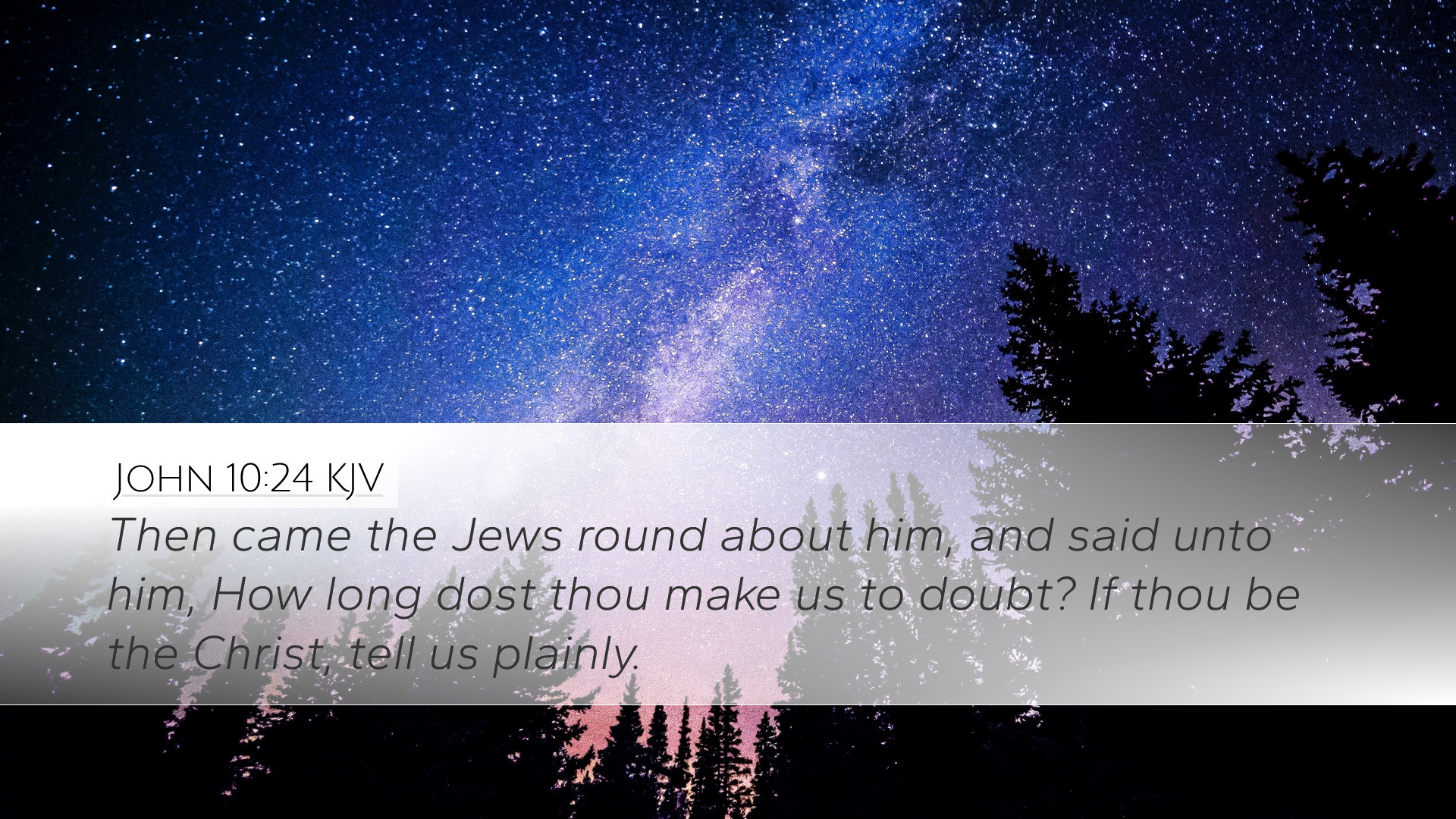Commentary on John 10:24
Introduction
The verse John 10:24 records a moment of intense inquiry and doubt regarding the identity of Jesus, as the Jews encircle Him with questions about His Messiahship. This commentary will explore the nuances of this passage, drawing insights from esteemed public domain commentaries, including those of Matthew Henry, Albert Barnes, and Adam Clarke. This analysis is aimed at pastors, students, theologians, and Bible scholars who seek to understand the theological implications contained within this verse.
Text of John 10:24
"Then came the Jews round about him, and said unto him, How long dost thou make us to doubt? If thou be the Christ, tell us plainly."
Contextual Background
In the previous chapters, Jesus had revealed His divine nature and mission, declaring Himself as the Good Shepherd (John 10:11). The context of this verse is critical; it speaks volumes about the prevailing disbelief in His authority and identity. The phrase "the Jews" indicates a collective group, likely referring to the religious leaders who were skeptical of His claims. This moment is pivotal, reflecting both the societal pressures of the day and the profound spiritual realities confronting Christ.
Exegesis of John 10:24
1. The Inquiry of the Jews
Matthew Henry emphasizes the earnestness of the Jews’ inquiry, noting that they "came round about him," indicating a desire to corner Him. Their question exhibits an urgency and frustration—they want clarity on whether Jesus is indeed the Messiah. This inquiry is not merely a casual question but rather a demand for unequivocal evidence of His claims.
2. The Nature of Doubt
Albert Barnes highlights the skepticism of the Jews. Their approach to Jesus embodies a philosophical and spiritual inquiry, asking how long He would keep them in doubt. This reveals a deeper spiritual malaise; it exemplifies the human tendency to filter divine truth through the lens of skepticism and doubt, a theme that resonates throughout the Gospels.
3. Jesus’ Response
While not fully captured in this particular verse, understanding how Jesus responds to this challenge is crucial. Adam Clarke notes that Jesus previously provided ample evidence of His identity through His miracles and teachings. Clarke argues that the question posed by the Jews reveals their hardness of heart and unwillingness to recognize the evidence already presented to them. Herein lies a profound lesson on the nature of faith and the often willful blindness of the human heart.
Theological Implications
This verse opens a dialogue about the nature of faith. The inquiry from the Jews raises questions about the criteria for belief. What does it mean to accept Jesus as the Messiah? Scripture repeatedly emphasizes the necessity of faith without concrete evidence. The Jews sought physical proof; however, true faith goes beyond physical signs—it engages the heart and spirit. Henry argues that faith comes by hearing, and hearing by the word of God (Romans 10:17), not solely by miracles.
Lessons for Contemporary Believers
This passage offers rich implications for contemporary believers:
- The Nature of Inquiry: Believers are encouraged to pursue truth earnestly, just as the Jews sought clarity. Doubt can lead to deeper understanding if approached thoughtfully.
- Responding to Doubt: Jesus’ patience in dealing with doubt exemplifies how Christians should respond to their own uncertainties and those of others. It highlights the need for compassionate dialogue centered on the truth of Scripture.
- Faith and Evidence: The balance between faith and reason is crucial. Romans 1:20 asserts that God's attributes are evident through creation, yet humans still struggle with belief. Acknowledging this struggle can lead to genuine faith that seeks understanding.
Conclusion
John 10:24 serves as a poignant reminder of the human condition—our proclivity for doubt juxtaposed against the divine call to faith. As pastors, students, theologians, and Bible scholars engage with this text, they are invited to explore the intersection of inquiry and belief, challenging themselves to a deeper engagement with the claims of Christ. The insights from Henry, Barnes, and Clarke encourage a reflective approach that affirms faith while embracing the questions that accompany the journey of belief.


